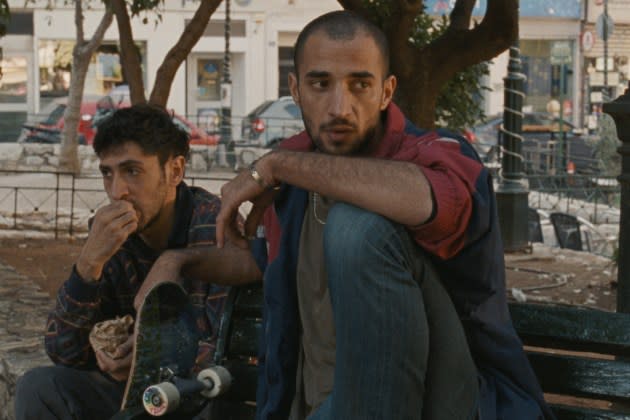‘To a Land Unknown’ Review: A Gritty Drama About Young Palestinians Caught in an Eternal State of Exile

The story behind the making of Palestinian-Danish director Mahdi Fleifel’s second feature, To a Land Unknown, is probably as intriguing as the film itself. Shot on the fly in Greece, with production beginning exactly a month after the Hamas attacks of October 7th, the movie was somehow completed in time to premiere at Cannes just over six months later.
That may be something of a record in terms of delivering a feature, but it also speaks to the precarious and volatile situation the film is depicting: that of Palestinian refugees stuck in Athens en route to someplace else, caught in a purgatory between a home they can’t return to and a new one they don’t know.
More from The Hollywood Reporter
Oscars: Canada Selects 'Universal Language' for Best International Feature Category
'Emilia Pérez' to Receive Ensemble Award at Mill Valley Film Festival (Exclusive)
For best friends Chatila (Mahmood Bakri) and Reda (Aram Sabbah), the heroes of Fleifel’s melancholic, shaggy-dog street movie, that purgatory has been going on for some time. When we first see the two 20somethings, they’re hanging out in a park seemingly doing nothing, until we realize they’re about to steal a woman’s purse. They have few resources and no possibilities of employment, so their only goal is to rob enough to purchase fake passports and move to Germany, where life could be better.
Holed up in a graffiti-filled squat occupied by other migrants, they lounge around in the day and kill time however they can, whether it’s skateboarding through the city or, in Reda’s case, shooting up heroin. Fleifel’s depiction of their world is both authentic and bleak: These are young men with passions and dreams like the rest of us — Chatila also has a wife and son stuck in a Lebanese refugee camp — but they’ve been rendered immobile by the situation in Palestine (though not specifically Gaza, which is never alluded to in the film) and all the strict European immigration policies working against them.
There’s a Midnight Cowboy-aspect to the story of two down-and-out dudes trying to make it out of the city toward someplace better, and the fact that Reda turns tricks in the park in order to pay for his drug habit is something straight out of 1970s New York. Likewise, the grainy 16mm photography of Thodoris Mihopoulos feels like a throwback to another era, when movies were made off-the-cuff with just a few actors and locations.
Fleifel channels that vibrant urban energy throughout much of the film, though there are some longueurs in the second half that a tighter edit could fix. A plot eventually kicks in when the two friends cross paths with a 13-year-old Palestinian kid, Malik (Mohammad Alsurafa), who’s trying to join an aunt in Italy. In what can only be described as an act of pure humanity, Chatila and Reda decide to help him out, even if it means postponing their own pipe dreams of getting to Germany and opening a café.
At that point, To a Land Unknown takes a decidedly darker turn, with Chatila enlisting a Greek woman (Angeliki Papoulia) to escort Malik on his flight, although she’s an alcoholic and not to be trusted. While the friends wait to see if their plan worked, they come up with another scheme to pose as smugglers and steal money from a trio of Syrian refugees. It’s truly a dog-eat-dog world where men with good intentions resort to crime, violence and even torture when there’s no other solution. Fleifel never shies away from the lasting damages that exile can cause, whether one makes it out or not.
Much of the film is set around the squats and streets of backwater Athens, and we never once visit any famous ruins or tourist sites of the Greek capital. At some point Chatila asks Malik if he’s ever seen the Acropolis, to which the boy responds: “Yes, everyday, it’s right there,” meaning he could care less about it when his entire future hangs in the balance.
That doesn’t mean To a Land Unknown lacks culture, must memorably when someone recites a few verses by Palestinian poet Mahmoud Darwish that are initially mistaken for rap lyrics. It’s a telling moment, especially as it describes the very situation that Chatila, Reda and so many others find themselves in as conflicts engulf the Middle East and other parts of the world. For all the running, skating and scheming the two friends do throughout the city, they seem condemned to remain where they are.
Best of The Hollywood Reporter
Sign up for Hollywoodreporter's Newsletter. For the latest news, follow us on Facebook, Twitter, and Instagram.